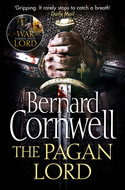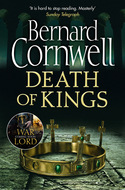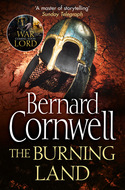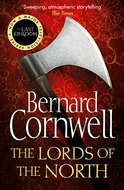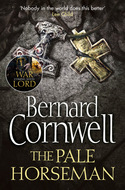Kitap dosya olarak indirilemez ancak uygulamamız üzerinden veya online olarak web sitemizden okunabilir.
Kitabı oku: «The Last Kingdom Series Books 1-6», sayfa 30
I gave the coats of mail to those who deserved them. We had lost two men, and another three were badly injured, but that was a light cost. We had, after all, killed twenty or thirty Danes and the survivors were ashore where the Britons might or might not treat them well. Best of all we had become rich and that knowledge was a consolation as night fell.
Hoder is the god of the night and I prayed to him. I threw my old helmet overboard as a gift to him, because all of us were scared of the dark that swallowed us, and it was a complete dark because clouds had come from the west to smother the sky. No moon, no stars. For a time there was the gleam of firelight on the northern shore, but that vanished and we were blind. The wind rose, the seas heaved us, and we brought the oars inboard and let the air and water carry us for we could neither see nor steer. I stayed on deck, peering into the dark, and Iseult stayed with me, under my cloak, and I remembered the look of delight on her face when we had gone into battle.
Dawn was grey and the sea was white-streaked grey and the wind was cold, and there was no land in sight, but two white birds flew over us and I took them for a sign and rowed in the direction they had gone, and late that day, in a bitter sea and cold rain, we saw land and it was the Isle of Puffins again where we found shelter in the cove and made fires ashore.
‘When the Danes know what we’ve done,’ Leofric said.
‘They’ll look for us,’ I finished the sentence for him.
‘Lots of them will look for us.’
‘Then it’s time to go home,’ I said.
The gods had been good to us and, next dawn, in a calming sea, we rowed south to the land and followed the coast towards the west. We would go around the wild headlands where the porpoises swam, turn east and so find home.
Much later I discovered what Svein had done after we parted company and, because what he did affected my life and made the enmity between me and Alfred worse, I shall tell it here.
I suspect that the thought of a gold altar at Cynuit had gnawed into his heart, for he carried the dream back to Glwysing where his men gathered. Glwysing was another kingdom of the Britons in the south of Wales, a place where there were good harbours and where the king welcomed the Danes for their presence prevented Guthrum’s men from raiding across the Mercian border.
Svein ordered a second ship and its crew to accompany him and together they attacked Cynuit. They came in the dawn, hidden by a mist, and I can imagine their beast-headed ships appearing in the early greyness like monsters from a nightmare. They went up river, oars splashing, then grounded the boats and the crews streamed ashore, men in mail and helmets, spear-Danes, sword-Danes, and they found the half-built church and monastery.
Odda the Younger was making the place, but he knew it was too close to the sea and so he had decided to make it a fortified building. The church’s tower was to be of stone, and high enough for men to keep a watch from its summit, and the priests and monks were to be surrounded by a palisade and a flooded ditch, but when Svein came ashore none of the work was finished and so it was indefensible, and besides, there were scarce forty troops there and those all died or fled within minutes of the Danes landing. The Danes then burned what work had been done and cut down the high wooden cross which customarily marked a monastery and which had been the first thing the builders had made.
The builders were monks, many of them novices, and Svein herded them together and demanded they show him where the valuables were hidden and promised them mercy if they told the truth. Which they did. There was not much of value, certainly no altar of gold, but supplies and timber needed to be purchased and so the monks had a chest of silver pennies which was reward enough for the Danes, who then pulled down the half-constructed church tower, wrecked the unfinished palisade and slaughtered some cattle. Then Svein asked the monks where Ubba was buried and was met by sullen silence, and the swords were drawn again and the question asked a second time, and the monks were forced to confess that the church was being built directly over the dead chieftain’s grave. That grave had been an earth mound, but the monks had dug it up and thrown the body into the river, and when the Danes heard that story the mercy fled from their souls.
The monks were made to wade in the river until some bones were found, and those bones were placed on a funeral pyre made from the timbers of the half-constructed buildings. It was, by all accounts, a huge pyre, and when it was lit, and when the bones were at the heart of a furnace blaze, the monks were thrown onto the flames. While their bodies burned the Danes selected two girls, captured from the soldiers’ shelters, raped them and then strangled them, sending their souls to be company for Ubba in Valhalla. We heard all this from two children who survived by hiding in a nettle patch, and some folk from the nearby town who were dragged to see the end of the funeral pyre. ‘Svein of the White Horse did this,’ they were told, and made to repeat the words. It was a Danish custom to leave some witnesses to their horror, so that the tales would spread fear and make cowards of other folk who might be attacked, and sure enough the story of the burned monks and murdered girls went through Wessex like a high wind through dry grass. It became exaggerated as such tales do. The number of dead monks went from sixteen to sixty, the raped girls from two to twenty, and the stolen silver from a chest of pennies to a hoard worthy of the gods. Alfred sent a message to Guthrum, demanding to know why he should not slaughter the hostages he held, and Guthrum sent him a present of gold, two captured gospel books and a grovelling letter in which he claimed that the two ships had not been from his forces, but were pirates from beyond the sea. Alfred believed him and so the hostages lived and the peace prevailed, but Alfred commanded that a curse should be pronounced on Svein in every church of Wessex. The Danish chieftain was to be damned through all eternity, his men were to burn in the fires of hell and his children, and his children’s children, were all to bear the mark of Cain. I asked a priest what the mark was, and he explained that Cain was the son of Adam and Eve and the first murderer, but he did not know what mark he had carried. He thought God would recognise it.
So Svein’s two ships sailed away, leaving a pillar of smoke on the Wessex shore, and I knew none of it. In time I would know all of it, but for now I was going home.
We went slowly, sheltering each night, retracing our steps that took us past the blackened hillside where Peredur’s settlement had stood, and on we went, under a summer’s sun and rain, until we had returned to the Uisc.
The Heahengel was afloat now and her mast was stepped, which meant Leofric could take her and the Eftwyrd, for the Fyrdraca was no more, back to Hamtun. We divided the plunder first and, though Leofric and I took the greater share, every man went away wealthy. I was left with Haesten and Iseult, and I took them up to Oxton where Mildrith wept with relief because she had thought I might be dead. I told her we had been patrolling the coast, which was true enough, and that we had captured a Danish ship laden with wealth, and I spilled the coins and gold bricks onto the floor and gave her a bracelet of amber and a necklace of jet, and the gifts distracted her from Iseult who watched her with wide, dark eyes, and if Mildrith saw the British girl’s jewellery she said nothing.
We had come back in time for the harvest, though it was poor for there had been much rain that summer. There was a black growth on the rye which meant it could not even be fed to the animals, though the straw was good enough to thatch the hall I built. I have always enjoyed building. I made the hall from clay, gravel and straw, all packed together to make thick walls. Oak beams straddled the walls, and oak rafters held a high, long roof that looked golden when the thatch was first combed into place. The walls were painted with powdered lime in water, and one of the local men poured ox-blood into the mix so that the walls were the colour of a summer sky at sunset. The hall’s great door faced east towards the Uisc and I paid a man from Exanceaster to carve the doorposts and lintels with writhing wolves, for the banner of Bebbanburg, my banner, is a wolf’s head. Mildrith wanted the carving to show saints, but she got wolves. I paid the builders well, and when other men heard that I had silver they came looking for employment, and though they were there to build my hall I took only those who had experience of fighting. I equipped them with spades, axes, adzes, weapons and shields.
‘You are making an army,’ Mildrith accused me. Her relief at my homecoming had soured quickly when it was apparent that I was no more a Christian than when I had left her.
‘Seventeen men? An army?’
‘We are at peace,’ she said. She believed that because the priests preached it, and the priests only said what they were told to say by the bishops, and the bishops took their orders from Alfred. A travelling priest sought shelter with us one night and he insisted that the war with the Danes was over.
‘We still have Danes on the border,’ I said.
‘God has calmed their hearts,’ the priest insisted and told me that God had killed the Lothbrok brothers, Ubba, Ivar and Halfdan, and that the rest of the Danes were so shocked by the deaths that they no longer dared to fight against Christians. ‘It is true, lord,’ the priest said earnestly, ‘I heard it preached in Cippanhamm, and the king was there and he praised God for the truth of it. We are to beat our swords into ard points and our spear blades into reaping hooks.’
I laughed at the thought of melting Serpent-Breath into a tool to plough Oxton’s fields, but then I did not believe the priest’s nonsense. The Danes were biding their time, that was all, yet it did seem peaceful as the summer slid imperceptibly into autumn. No enemies crossed the frontier of Wessex and no ships harried our coasts. We threshed the corn, netted partridges, hunted deer on the hill, staked nets in the river and practised with our weapons. The women span thread, gathered nuts, and picked mushrooms and blackberries. There were apples and pears, for this was the time of plenty, the time when the livestock was fattened before the winter slaughter. We ate like kings and, when my hall was finished, I gave a feast and Mildrith saw the ox head over the door and knew it was an offering to Thor, but said nothing.
Mildrith hated Iseult, which was hardly surprising, for I had told Mildrith that Iseult was a queen of the Britons and that I held her for the ransom that the Britons would offer. I knew no such ransom would ever come, but the story went some way to explaining Iseult’s presence, but Mildrith resented that the British girl was given her own house. ‘She is a queen,’ I said.
‘You take her hunting,’ Mildrith said resentfully.
I did more than that, but Mildrith chose to be blind to much of it. Mildrith wanted little more than her church, her baby and an unvarying routine. She had charge of the women who milked the cows, churned the butter, span wool and collected honey, and she took immense pride that those things were done well. If a neighbour visited there would be a flurry of panic as the hall was cleaned, and she worried much about those neighbours’ opinions. She wanted me to pay Oswald’s wergild. It did not matter to Mildrith that the man had been caught thieving, because to pay the wergild would make peace in the valley of the Uisc. She even wanted me to visit Odda the Younger. ‘You could be friends,’ she pleaded.
‘With that snake?’
‘And Wirken says you have not paid the tithe.’
Wirken was the priest in Exanmynster, and I hated him. ‘He eats and drinks the tithe,’ I snarled. The tithe was the payment all landholders were supposed to make to the church, and by rights I should have sent Wirken part of my harvest, but I had not. Yet the priest was often at Oxton, coming when he thought I was hunting, and he ate my food and drank my ale and was growing fat on them.
‘He comes to pray with us,’ Mildrith said.
‘He comes to eat,’ I said.
‘And he says the bishop will take the land if we don’t pay the debt.’
‘The debt will be paid,’ I said.
‘When? We have the money!’ She gestured at the new hall. ‘When?’ she insisted.
‘When I want to,’ I snarled. I did not tell her when, or how, because if I had, then Wirken the priest would know, and the bishop would know. It was not enough to pay the debt. Mildrith’s father had foolishly donated part of our land’s future produce to the church, and I wanted that burden taken away so the debt would not go on through eternity, and to do that I needed to surprise the bishop, and so I kept Mildrith ignorant, and inevitably those arguments would end with her tears. I was bored with her and she knew it. I found her beating Iseult’s maid one day. The girl was a Saxon I had given to Iseult as a servant, but she also worked in the dairy and Mildrith was beating her because some cheeses had not been turned. I dragged Mildrith away, and that, of course, provoked another argument and Mildrith proved not to be so blind after all for she accused me of trying to whelp bastards on Iseult, which was true enough, but I reminded her that her own father had sired enough bastards, half a dozen of whom now worked for us. ‘You leave Iseult and her maid alone,’ I said, causing more tears. They were not happy days.
It was the time when Iseult learned to speak English, or at least the Northumbrian version of English for she learned it mostly from me. ‘You’re my mon,’ she said. I was Mildrith’s man and Iseult’s mon. She said she had been born again on the day I came into Peredur’s hall. ‘I had dreamed of you,’ she said, ‘tall and golden haired.’
‘Now you don’t dream?’ I asked, knowing that her powers of scrying came from dreams.
‘I do still dream,’ she said earnestly, ‘my brother speaks to me.’
‘Your brother?’ I asked, surprised.
‘I was born a twin,’ she told me, ‘and my brother came first and then, as I was born, he died. He went to the shadow world and he speaks to me of what he sees there.’
‘What does he see?’
‘He sees your king.’
‘Alfred,’ I said sourly, ‘is that good or bad?’
‘I don’t know. The dreams are shadowy.’
She was no Christian. Instead she believed that every place and every thing had its own god or goddess; a nymph for a stream, a dryad for a wood, a spirit for a tree, a god for the fire and another for the sea. The Christian god, like Thor or Odin, was just one more deity among this unseen throng of powers, and her dreams, she said, were like eavesdropping on the gods. One day, as she rode beside me on the hills above the empty sea, she suddenly said that Alfred would give me power.
‘He hates me,’ I told her, ‘he’ll give me nothing.’
‘He will give you power,’ she said flatly. I stared at her and she gazed to where the clouds met the waves. Her black hair was unbound and the sea wind stirred it. ‘My brother told me,’ she said. ‘Alfred will give you power and you will take back your northern home and your woman will be a creature of gold.’
‘My woman?’
She looked at me and there was sadness in her face. ‘There,’ she said, ‘now you know,’ and she kicked back her heels and made the horse run along the ridge top, her hair streaming, her eyes wet with tears. I wanted to know more, but she said she had told me what she had dreamed and I must be content.
At summer’s end we drove the swine into the forests to feed on the fallen beechnuts and acorns. I bought bags of salt because the killing time was coming and the meat of our pigs and cattle would have to be salted into barrels to feed us through the winter. Some of that food would come from the men who rented land at the edge of the estate, and I visited them all so they would know I expected payment of wheat, barley and livestock, and, to show them what would happen if they tried to cheat me, I bought a dozen good swords from a smith in Exanceaster. I gave the swords to my men, and in the shortening days we practised with them. Mildrith might not believe war was coming, but I did not think God had changed Danish hearts.
The late autumn brought heavy rain and the shire-reeve to Oxton. The reeve was called Harald and he was charged with keeping the peace of Defnascir, and he came on horseback and with him were six other horsemen, all in mail coats and helmets, and all with swords or spears. I waited for him in the hall, making him dismount and come into the smoky shadows. He came cautiously, expecting an ambush, then his eyes became accustomed to the gloom and he saw me standing by the central hearth. ‘You are summoned to the shire court,’ he told me.
His men had followed Harald into the hall. ‘You bring swords into my house?’ I asked.
Harald looked around the hall and he saw my men armed with their spears and axes. I had seen the horsemen approaching and summoned my men and ordered them to arm themselves.
Harald had the reputation of being a decent man, sensible and fair, and he knew how weapons in a hall could lead to slaughter. ‘You will wait outside,’ he told his men, and I gestured for my men to put their weapons down. ‘You are summoned …’ Harald began again.
‘I heard you,’ I said.
‘There is a debt to be paid,’ he said, ‘and a man’s death to make good.’
I said nothing. One of my hounds growled softly and I put a hand into its fur to silence it.
‘The court will meet on All Saints’ Day,’ Harald said, ‘at the cathedral.’
‘I shall be there,’ I said.
He took off his helmet to reveal a balding pate fringed with brown hair. He was at least ten years older than I, a big man, with two fingers missing from his shield hand. He limped slightly as he walked towards me. I calmed the hounds, waited.
‘I was at Cynuit,’ he said to me, speaking softly.
‘So was I,’ I said, ‘though men pretend I was not.’
‘I know what you did,’ he said.
‘So do I.’
He ignored my surliness. He was showing me sympathy, though I was too proud to show I appreciated it. ‘The ealdorman has sent men,’ he warned me, ‘to take this place once judgment is given.’
There was a gasp behind me and I realised Mildrith had come into the hall. Harald bowed to her.
‘The hall will be taken?’ Mildrith asked.
‘If the debt is not paid,’ Harald said, ‘the land will be given to the church.’ He stared up at the newly hewn rafters as if wondering why I would build a hall on land doomed to be given to God.
Mildrith came to stand beside me. She was plainly distressed by Harald’s summons, but she made a great effort to compose herself. ‘I am sorry,’ she said, ‘about your wife.’
A flicker of pain crossed Harald’s face as he made the sign of the cross. ‘She was sick a long time, lady. It was merciful of God, I think, to take her.’
I had not known he was a widower, nor did I care much. ‘She was a good woman,’ Mildrith said.
‘She was,’ Harald said.
‘And I pray for her.’
‘I thank you for that,’ Harald said.
‘As I pray for Odda the Elder,’ Mildrith went on.
‘God be praised, he lives,’ Harald made the sign of the cross again. ‘But he is feeble and in pain.’ He touched his scalp showing where Odda the Elder had been wounded.
‘So who is the judge?’ I asked harshly, interrupting the two.
‘The bishop,’ Harald said.
‘Not the ealdorman?’
‘He is at Cippanhamm.’
Mildrith insisted on giving Harald and his men ale and food. She and Harald talked a long time, sharing news of neighbours and family. They were both from Defnascir and I was not, and so I knew few of the folk they talked about, but I pricked up my ears when Harald said that Odda the Younger was marrying a girl from Mercia. ‘She’s in exile here,’ he said, ‘with her family.’
‘Well born?’ Mildrith asked.
‘Exceedingly,’ Harald said.
‘I wish them much joy,’ Mildrith said with evident sincerity. She was happy that day, warmed by Harald’s company, though when he had gone she chided me for being churlish. ‘Harald is a good man,’ she insisted, ‘a kind man. He would have given you advice. He would have helped you!’
I ignored her, but two days later I went into Exanceaster with Iseult and all my men. Including Haesten I now had eighteen warriors and I had armed them, given them shields and leather coats, and I led them through the market that always accompanied the court’s sittings. There were stiltwalkers and jugglers, a man who ate fire, and a dancing bear. There were singers, harpists, storytellers, beggars, and pens of sheep, goats, cattle, pigs, geese, ducks and hens. There were fine cheeses, smoked fish, bladders of lard, pots of honey, trays of apples and baskets of pears. Iseult, who had not been to Exanceaster before, was amazed at the size of the city, and the life of it, and the seething closeness of its houses, and I saw folk make the sign of the cross when they saw her for they had heard of the shadow queen held at Oxton and they knew her for a foreigner and a pagan.
Beggars crowded at the bishop’s gate. There was a crippled woman with a blind child, men who had lost arms or legs in the wars, a score of them, and I threw them some pence, then, because I was on horseback, ducked under the archway of the courtyard beside the cathedral where a dozen chained felons were awaiting their fate. A group of young monks, nervous of the chained men, were plaiting beehives, while a score of armed men were clustered around three fires. They eyed my followers suspiciously as a young priest, his hands flapping, hurried across the puddles. ‘Weapons are not to be brought into the precinct!’ he told me sternly.
‘They’ve got weapons,’ I nodded at the men warming themselves by the flames.
‘They are the reeve’s men.’
‘Then the sooner you deal with my business,’ I said, ‘the sooner my weapons will be gone.’
He looked up at me, his face anxious. ‘Your business?’
‘Is with the bishop.’
‘The bishop is at prayer,’ the priest said reprovingly, as though I should have known that. ‘And he cannot see every man who comes here. You can talk to me.’
I smiled and raised my voice a little. ‘In Cippanhamm, two years ago,’ I said, ‘your bishop was friends with Eanflæd. She has red hair and works her trade out of the Corncrake tavern. Her trade is whoring.’
The priest’s hands were flapping again in an attempt to persuade me to lower my voice.
‘I’ve been with Eanflæd,’ I said, ‘and she told me about the bishop. She said …’
The monks had stopped making beehives and were listening, but the priest cut me off by half shouting. ‘The bishop might have a moment free.’
‘Then tell him I’m here,’ I said pleasantly.
‘You are Uhtred of Oxton?’ he asked.
‘No,’ I said. ‘I am the Lord Uhtred of Bebbanburg.’
‘Yes, lord.’
‘Sometimes known as Uhtredærwe,’ I added mischievously. Uhtred the Wicked.
‘Yes, lord,’ the priest said again and hurried away.
The bishop was called Alewold and he was really the bishop of Cridianton, but that place had not been thought as safe as Exanceaster and so for years the bishops of Cridianton had lived in the larger town which, as Guthrum had shown, was not the wisest decision. Guthrum’s Danes had pillaged the cathedral and the bishop’s house, which was still scantily furnished and I discovered Alewold sitting behind a table that looked as if it had once belonged to a butcher, for its hefty top was scored with knife cuts and stained with old blood. He looked at me indignantly. ‘You should not be here,’ he said.
‘Why not?’
‘You have business before the court tomorrow.’
‘Tomorrow,’ I said, ‘you sit as a judge. Today you are a bishop.’
He acknowledged that with a small nod. He was an elderly man with a heavy jowled face and a reputation as a severe judge. He had been with Alfred in Scireburnan when the Danes arrived in Exanceaster, which is why he was still alive, and, like all the bishops in Wessex, he was a fervent supporter of the king, and I had no doubt that Alfred’s dislike of me was known to Alewold, which meant I could expect little clemency when the court sat.
‘I am busy,’ Alewold said, gesturing at the parchments on the stained table. Two clerks shared the table and a half-dozen resentful priests had gathered behind the bishop’s chair.
‘My wife,’ I said, ‘inherited a debt to the church.’
Alewold looked at Iseult who alone had come into the house with me. She looked beautiful, proud and wealthy. There was silver at her throat and in her hair, and her cloak was fastened with two brooches, one of jet and the other of amber. ‘Your wife?’ the bishop asked snidely.
‘I would discharge the debt,’ I said, ignoring his question, and I tipped a bag onto his butcher’s table and the big silver plate we had taken from Ivar slid out. The silver made a satisfying noise as it thumped down and suddenly, in that small dark room ill-lit by three rush lights and a small, wood-barred window, it seemed as if the sun had come out. The heavy silver glowed and Alewold just stared at it.
There are good priests. Beocca is one and Willibald another, but I have discovered in my long life that most churchmen preach the merits of poverty while they lust after wealth. They love money and the church attracts money like a candle brings moths. I knew Alewold was a greedy man, as greedy for wealth as he was for the delights of a red-haired whore in Cippanhamm, and he could not take his eyes from that plate. He reached out and caressed the thick rim as if he scarce believed what he was seeing, and then he pulled the plate towards him and examined the twelve apostles. ‘A pyx,’ he said reverently.
‘A plate,’ I said casually.
One of the other priests leaned over a clerk’s shoulder. ‘Irish work,’ he said.
‘It looks Irish,’ Alewold agreed, then looked suspiciously at me. ‘You are returning it to the church?’
‘Returning it?’ I asked innocently.
‘The plate was plainly stolen,’ Alewold said, ‘and you do well, Uhtred, to bring it back.’
‘I had the plate made for you,’ I said.
He turned the plate over, which took some effort for it was heavy, and once it was inverted he pointed to the scratches in the silver. ‘It is old,’ he said.
‘I had it made in Ireland,’ I said grandly, ‘and doubtless it was handled roughly by the men who brought it across the sea.’
He knew I was lying. I did not care. ‘There are silversmiths in Wessex who could have made you a pyx,’ one of the priests snapped.
‘I thought you might want it,’ I said, then leaned forward and pulled the plate out of the bishop’s hands, ‘but if you prefer West Saxon work,’ I went on, ‘then I can …’
‘Give it back!’ Alewold said and, when I made no move to obey, his voice became pleading. ‘It is a beautiful thing.’ He could see it in his church, or perhaps in his hall, and he wanted it. There was silence as he stared at it. If he had known that the plate existed, if I had told Mildrith of it, then he would have had a response ready, but as it was he was overwhelmed by desire for the heavy silver. A maid brought in a flagon and he waved her out of the room. She was, I noted, red-haired. ‘You had the plate made,’ Alewold said sceptically.
‘In Dyflin,’ I said.
‘Is that where you went in the king’s ship?’ the priest who had snapped at me asked.
‘We patrolled the coast,’ I said, ‘nothing more.’
‘The value of the plate,’ Alewold began, then stopped.
‘Is far and above the debt Mildrith inherited,’ I said. That was probably not true, but it was close to the amount, and I could see Alewold did not care. I was going to get what I wanted.
The debt was discharged. I insisted on having that written down, and written three times, and I surprised them by being able to read and so discovering that the first scrap of parchment made no mention of the church yielding their rights to the future produce of my estate, but that was corrected and I let the bishop keep one copy while I took two. ‘You will not be arraigned for debt,’ the bishop said as he pressed his seal into the wax of the last copy, ‘but there is still the matter of Oswald’s wergild.’
‘I rely on your good and wise judgment, bishop,’ I said, and I opened the purse hanging at my waist and took out a small lump of gold, making sure he could see there was more gold inside as I placed the small lump on the plate. ‘Oswald was a thief.’
‘His family will make oaths that he was not,’ the priest said.
‘And I will bring men who will swear he was,’ I said. A trial relied heavily on oaths, but both sides would bring as many liars as they could muster, and judgment usually went to the better liars or, if both sides were equally convincing, to the side who had the sympathy of the onlookers. It was better, though, to have the sympathy of the judge. Oswald’s family would have many supporters around Exanceaster, but gold is much the best argument in a law court.
And so it proved. To Mildrith’s astonishment the debt was paid and Oswald’s family denied two hundred shillings of wergild. I did not even bother to go to the court, relying on the persuasive power of gold, and sure enough the bishop peremptorily dismissed the demand for wergild, saying it was well known that Oswald had been a thief, and so I won. That did not make me any more popular. To the folk who lived in the Uisc’s valley I was a Northumbrian interloper and, worse, it was known I was a pagan, but none dared confront me for I went nowhere beyond the estate without my men and my men went nowhere without their swords.

